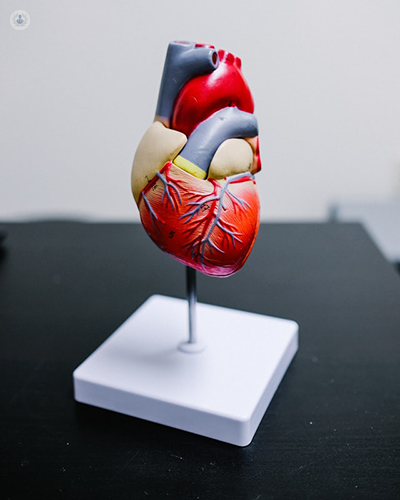Beating heart coronary bypass surgery explained
Written by:Beating heart coronary bypass surgery, also referred to as off-pump bypass surgery, is an innovative technique in the surgical treatment of coronary artery disease that offers improved outcomes for patients. In this informative article, leading consultant cardiothoracic surgeon Mr Alberto Albanese offers expert insight on how the modern procedure differs from more traditional surgical techniques as well as detailing the risks and benefits for cardiac surgery patients.

What is beating heart coronary bypass surgery?
The coronary arteries deliver nutrients and oxygenated blood to the heart. If you have coronary artery disease in which one or more blood vessels feeding the heart are blocked, you may be able to manage your condition with only lifestyle changes or medication. For some patients, a medical procedure called coronary angioplasty, also known as coronary stenting, is also advised.
However, if your disease is severe and involves many blood vessels, you may be facing coronary artery bypass surgery. This surgery was traditionally performed with the assistance of the cardiac pulmonary bypass technique. This uses a machine, often called a heart-lung machine, which allows the heart to be stopped during the procedure so that the surgeon can operate on a surface which is still and blood-free. The heart-lung machine maintains life despite the lack of a heartbeat. It removes all of the toxins and replaces them with oxygenated blood before pumping the blood back to through the patient’s body.
The heart-lung machine has historically saved many lives. However, innovative techniques now allow for the heart to continue to pump during surgery in a procedure known as beating heart coronary bypass. This modern method is also sometimes referred to as an off-pump bypass procedure, as the traditional heart-lung machine is not used.
How does it differ from traditional bypass surgery?
Off-pump coronary bypass surgery differs from a traditional coronary artery bypass graft operation because the heart-lung machine is not used. Rather than stopping the heart, technological advances have created a new kind of operating equipment which allows the surgeon to hold and stabilise portions of the heart during surgery. With a particular area of the heart stabilised, the surgeon is able to perform a bypass to the blocked artery in a highly controlled operative environment. Meanwhile, the rest of the heart keeps beating and pumping blood so it continues to circulate around the body.
With the present technology, in theory, all arteries of the heart can be bypassed off-pump. The vast majority of patients needing coronary bypass surgery may be suitable for the innovative, beating heart technique. It is ideal for certain patients who are at increased risk of complications from the heart-lung machine traditionally used. Such patients may be those with heavy aortic calcifications, pre-existing liver failure or compromised pulmonary or renal function.
Not all patients, however, are good candidates for off-pump procedures. The suitability of the patient for this technique is established during the pre-surgical assessment but the final decision is made intra-operatively when the heart and arteries are evaluated and assessed more closely.
What are the advantages?
The aim of off-pump surgery is to decrease likelihood of fatality and complications associated with traditional coronary artery bypass surgery. These complications can include stroke, kidney or lung failure and the need for blood transfusion.
Recently, specialists are looking with great interest at the possibility that off-pump surgery may reduce the risk of a further complication of more traditional techniques which use the heart-lung machine. This complication relates to cognitive and mental changes which have been seen in many patients who have undergone an on-pump coronary artery bypass graft procedure.
What are the risks and side effects?
The beating heart coronary bypass surgical technique is, in principle, more challenging and more demanding for the surgeon because the heart keeps beating throughout. Therefore, the main potential risk is graft failure. However, with advanced modern technologies and increased surgical experience, this risk is now extremely low. There are few side effects to off-pump procedures but there are great advantages.
What can a patient expect during recovery from beating heart coronary bypass surgery?
A patient should be able to recover quickly after off-pump surgery compared with the traditional on-pump technique. Off-pump beating heart surgery has a reduced risk of general complications as well as shorter intensive care and overall hospital stays. The likelihood that the patient will need a blood transfusion is also lower.
In summary, beating heart coronary bypass surgery offers quicker recovery, great benefits and fewer complications and risks.
If you are seeking treatment for coronary artery disease or would like more information, don’t hesitate to visit Mr Albanese’s Top Doctors profile.


